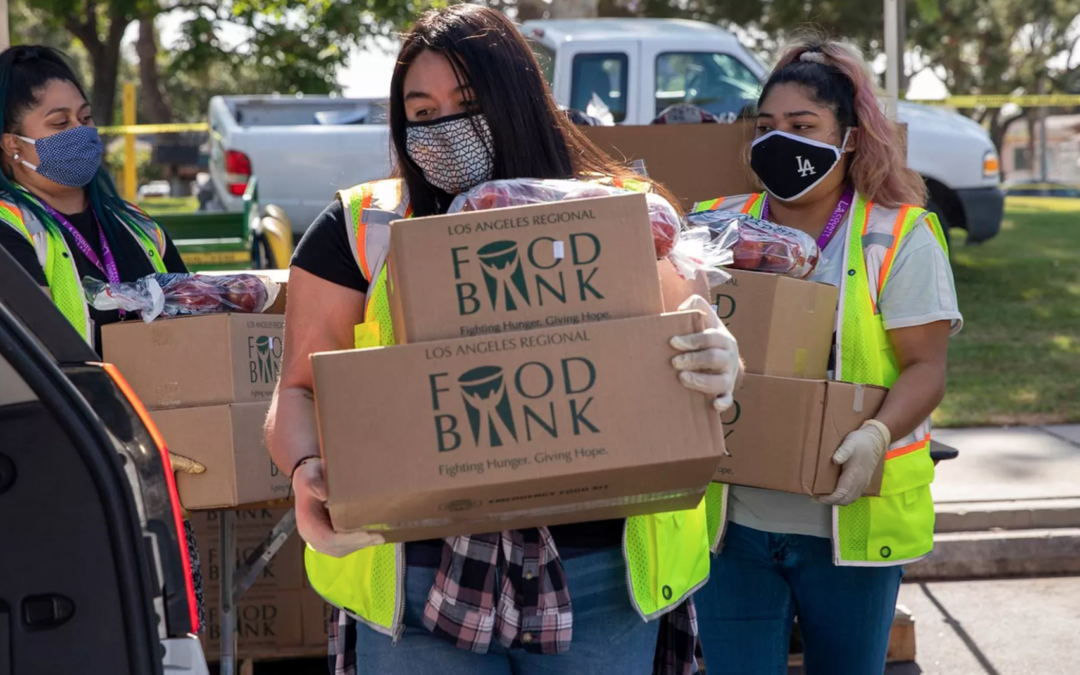
by Sydney Mathews | Nov 10, 2020 | Feature, General, News
Los Angeles, CA. The Healthy LA Coalition was established by a number of nonprofit organizations looking for solutions to the hardships caused by COVID-19 in the LA County area. (Above photo is of volunteers at Maywood YMCA for LA Regional Food Bank).
“We actually came together for the first time on the evening of March 12th,” said David Levitus, one of the original co-organizers of Healthy LA, “I ended up putting together the Healthy LA website for two hours on Saturday on the 14th, got it published, put up a Google form to collect signatures, and it just snowballed from there.”
It started with twenty-five people on a conference call discussing how they can help with pushing legislation that will help the community affected by the pandemic. After the creation of the official website, Healthy LA would quickly grow from a network of twenty-five in March to 335 by the end of the summer. While the majority of organizations that were added to the website were nonprofits, thirty-five religious congregations/denominations and twenty-eight regular businesses had also joined the coalition via application through Levitus’s Google form.
The rapid growth of the Healthy LA Coalition over the course of a few months allowed the network of organizations to develop thirty different legislative proposals to the board of supervisors for LA County.
“We just knew that the crisis was so big that even on the economic side, we needed nothing less than really bold proposals,” Levitus stated.
Twenty of the thirty proposals Healthy LA presented to the LA City Council and County Supervisors were enacted through immense lobbying efforts and communicating to the general public about the proposed legislation. The proposals covered a wide array of protection for the community including the unhoused, undocumented, and incarcerated individuals in the county.
Levitus considered their collective effort to increase worker protection was one of the most significant victories for Healthy LA as it guaranteed fourteen days of sick leave for an additional 440,000 LA workers. These city and county workers were not originally eligible for the federal paid sick leave policy as they worked in firms with over five hundred employees.
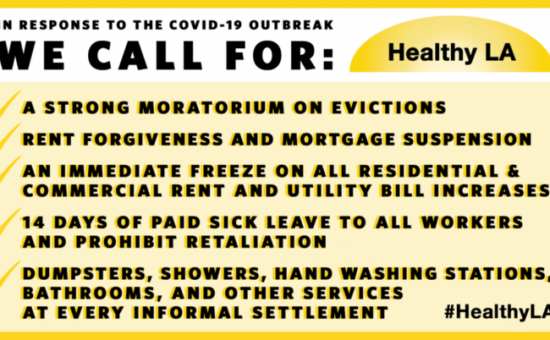
The initial website banner for Healthy LA and its main proposals which have nearly all been passed by the LA City Council and Board of Supervisors.
One of the proposals that have proved to be more challenging to pass on both a county and state level is a robust moratorium for foreclosures and evictions. There are currently protections for tenants who are unable to pay for their rent that has recently been extended to March 2021; however, if tenants are unable to pay the minimum 25% of their regular rent in the coming months, they can be evicted as early as February 1. Considering that the moratorium could have been extended as far as 2024, Healthy LA continues to advocate for tenants who face eviction in the next year.
Levitus stated that the long-term goal for Healthy LA is a “just recovery” as there are often marginalized groups of people who are left out of recovery as seen in the 2008 Great Recession. He hopes to continue giving workers a voice; as well as, tenants because a recent UCLA study showed roughly 20% of city residents have struggled to pay rent on time.
Levitus believes there is still a lot of work to be done to help those who need it most and that drastic social reform as seen after the Civil War and the Civil Rights Movement would make a positive difference to Los Angeles and beyond.
“We need a third reconstruction,” Levitus said in consideration to the coalition’s goals beyond COVID-19, “to transform our society that is racially and economically just, and I think we all share that perspective at Healthy LA so that’s really the long-term vision.”
From Healthy LA Coalition:
We are a network of more than 330 advocacy organizations, worker centers, labor unions, service providers, religious congregations, community groups, affordable housing developers, public interest lawyers, public health and safety organizations, and many more uniting to propose concrete solutions to the many hardships caused by the COVID-19 pandemic.
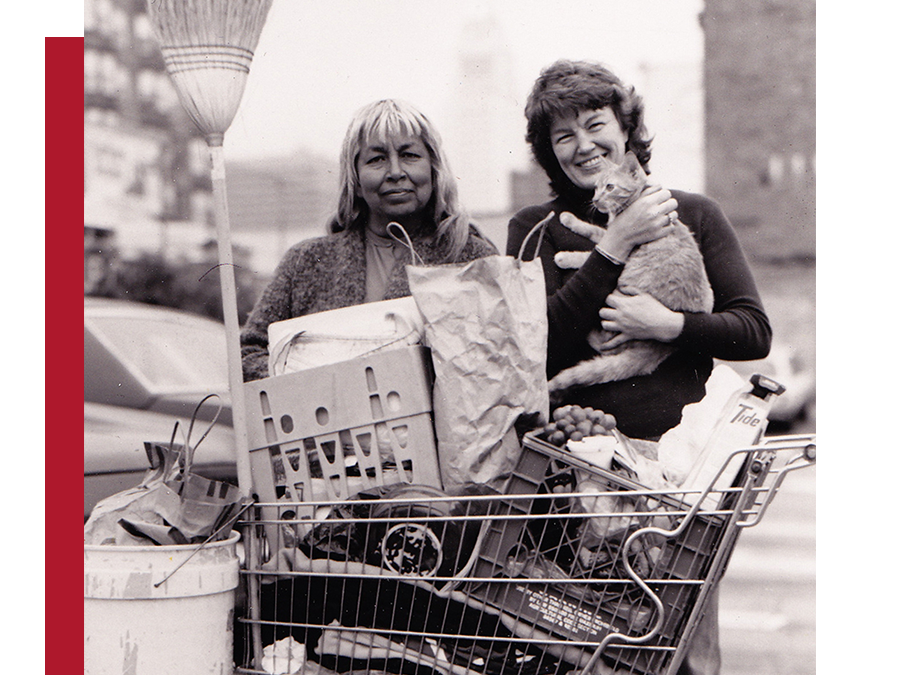
by Yasmin Vieira | Oct 30, 2020 | Feature, General, News |
Los Angeles, CA. Over the last forty years, The Downtown Women’s Center (DWC) has helped nearly 110,000 disadvantaged women with meals and housing. DWC was launched in 1978 because of the friendship between two women; Jill Halverson (pictured on the right above) created the nonprofit to help an inspiring homeless woman, and friend named Rosa (pictured above on the left). During the four decades that followed, DWC has grown into a nonprofit providing many vital services to disadvantaged women. DWC is the only organization in Los Angeles focused exclusively on serving and empowering women experiencing homelessness and formerly homeless women.
DWC representative Anita Vukovic says it’s hard to keep up with all the need, especially during a pandemic. “A lot of DWC work had to change due to consideration of social distancing measures, our community is especially vulnerable to COVID-19 due to underlying health conditions that many women experience. Our community is usually 55 years old and older,” Vukovic explained. DWC is able to provide more than 800 meals a day and offer on-site services in its parking lot, which enables social distancing. “Our health clinic also continues to operate Tuesday to Friday.”

Today, DWC manages 119 units of permanent housing across greater Los Angeles (like the apartment seen above) and has grown to serve more than 5,400 women annually.
DWC was recently selected as one of the 2020 California Nonprofit of the Year by California Senator Holly Mitchell of the 30th Senate District. DWC is one of over a hundred other nonprofits that will be honored by their state senators and assembly members for their contributions. State leaders want to honor DWC staff and volunteers, because they provide women with access to basic needs and resources, housing assistance, trauma-informed case management, mental and physical healthcare, job readiness and workforce development, and advocacy training and resources. “As our services expand to meet the community’s growing needs under COVID-19, we are deeply humbled to be recognized as a 2020 Nonprofit of the Year,” said DWC Chief Executive Officer Amy Turk. “DWC’s decades-long relationship with Senator Mitchell has always been a special one, and we are thrilled to continue working with her to bring greater visibility and resources to women experiencing homelessness in Los Angeles and across California.”
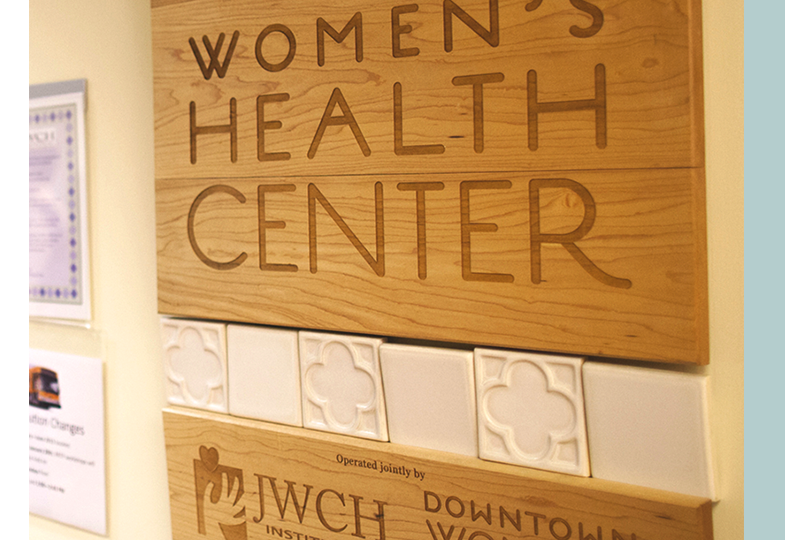
Women’s Health Center Clinic, DWC.

The Covid-19 pandemic has also made it difficult for DWC to use outside helpers.
“Volunteers have been the heart of our community in everything we do and how we are able to serve women,” says, Vukovic. DWC is still looking for opportunities to get their volunteers together. In September DWC had a three-week virtual campaign. “We saw a lot of positive feedback and engagement with that, people were really excited to be able to engage. We are looking into actually continue with that into the future.”
From Women’s Health Center:
How can you be informed on Housing First and Trauma-Informed:
- Access to basic needs and resources through our Day Center, where women can receive three daily meals and access to showers, restrooms, mail, laundry, and telephones.
- On-site housing and supportive services, with our 119 units of permanent housing across two residences making us one of the largest housing providers for women in the country.
- Community-based housing services, provided in partnership with the Los Angeles County Department of Health Services, the Los Angeles Homeless Services Authority (LAHSA), the Governor’s Office of Emergency Services, and various private foundations and corporations.
- Health and wellness services, including individual and group counseling, medical care, mental health services, preventive screenings, Trauma Recovery Center services, and enrichment activities.
- Job readiness and employment training, as well as job placement services and transitional jobs at MADE by DWC, in partnership with LA:RISE.
- Advocacy training, to empower women to become successful advocates for themselves and others by participating in press interviews, public policy meetings, lobby visits with legislators, fundraising events, press conferences, and more.
- Public education and volunteering, with a volunteer program that engages over 5,000 individuals annually.
- Research and evaluation, to continue to push the envelope on creative solutions to ending homelessness by providing real-time data on needs and impacts (see the DWC 2019 Los Angeles City Women’s Needs Assessment here).
We envision a Los Angeles with every woman housed and on a path to personal stability. Our mission is to end homelessness for women in greater Los Angeles through housing, wellness, and advocacy.
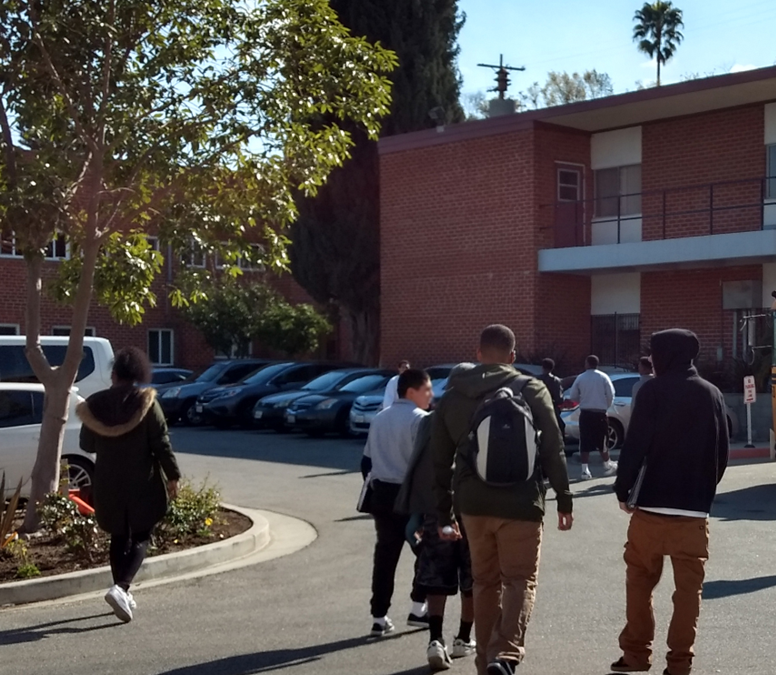
by Shelbrena Payne | Oct 22, 2020 | Feature, General, News
Los Angeles, CA. “It has been a difficult time, to say the least,” says Silvio Orlando, CEO of Optimist Youth Homes & Family Services. During the beginning of the pandemic, purchasing personal protective equipment was no easy feat. Still, resident students have been able to stay on campus while taking classes remotely. Prior to the pandemic, they’d walk from class to class, as seen above. Online learning is one of the many challenges faced by the organization. However, Optimist Youth Homes & Family Services remains devoted to the mental, educational, and physical wellbeing of all the foster children, young adults, and families they serve.
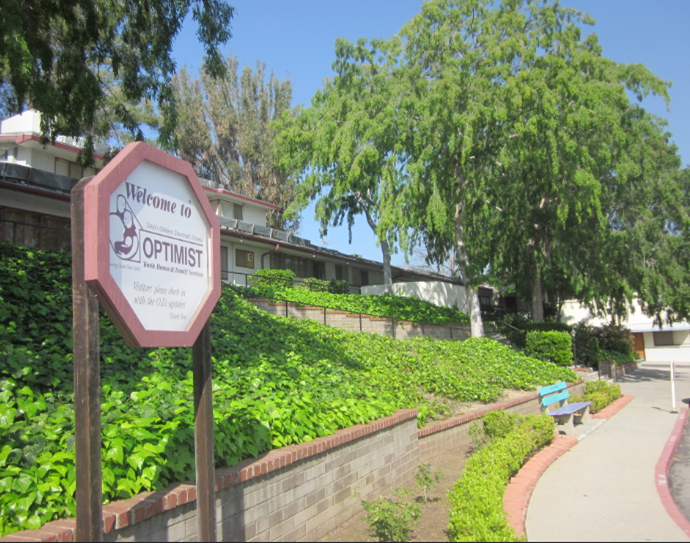
Welcome to Optimist Youth Homes & Family Services
Covid-19 continues to impact the lives of millions of American schoolchildren, including the at-risk and foster youth at Optimist Youth Homes & Family Services.
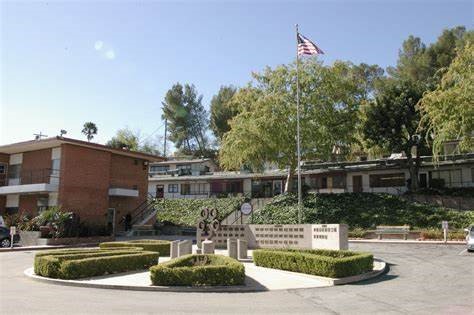
Optimist Youth Home & Family Services is still serving the community for many years.
In June of 2020, Optimist Youth Homes & Family Services was forced into lockdown when several students and staff members became infected. “The virus not brought in by a student but a staff member,” says Silvio. Continuously educating the staff on Covid-19 and how to prevent the spread remains a top priority. Since the outbreak staff have become more compliant. Working with the Public Health Department and County to ensure the health and safety of students and staff has been a tremendous success. The Public Health Department stated Optimist Youth Homes & Family Services was “doing great.” There have been no outbreaks since.
Foundation grants have been made more readily available and leniency has been given during this time. While cash donations have not seen an increase, non-cash donations have. The non-cash supplies have included face masks and hand sanitizers.
Optimist Youth Homes & Family Services have a lot of committed mentors and volunteers who work with and for the students. Unfortunately, “volunteers would like to be involved at this time,” says Silvio but due to the safety measures put in place for the children and staff, no volunteers have been allowed.
“We are coping, and our spirits continue to stay high,” as the holiday season is around the corner and major events such as the Mentor Award Gala maybe postponed or canceled. “Major events that raise money are no more,” says Silvio. The decline in monetary donations has sparked the robust creativity by Annie Nuttall, Chief Advancement and Communications Officer and staff leading to new opportunities such as drive-in events, and this year’s Holiday Wish List.
Optimist Youth Homes & Family Services continues to combat the stigmas surrounding mental health. Highly trained therapists provide a variety of integral therapeutic services tailoring to each person’s needs. Offering a wide variety of residential and community therapy programs. These programs are essential to the development and well-being of the children, young adults, and families they serve. Outpatient therapists have been a vital resource during the pandemic. Therapy sessions over zoom have worked exceedingly well. Virtual therapy sessions are safer and some clients find the alternative more enjoyable. Optimist Youth Homes & Family Services is working to keep the virtual services and outreach on mental wellness, well into the future even after the pandemic.
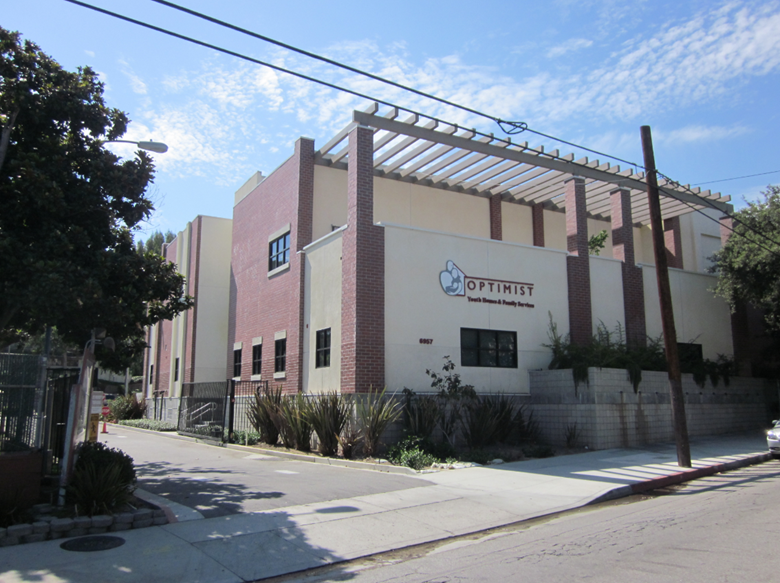
Optimist Youth Homes & Family Services campus building.
From Optimist Youth Homes & Family Services:
With your help, Optimist Youth Homes & Family Services can continue to provide, care for and transform the lives of the at-risk foster youth, children, young adults, and the families in the community they serve.
OUR MISSION
Our mission is to provide innovative and individualized treatment, education, and support services to children, young adults and families to better their lives.
OUR VISION
Optimist envisions a world where all children, young adults, and families will have the opportunity to receive the care and support they need to succeed.
Visit Optimist Youth Homes & Family Services for more information. Also, see their donation page, and this year’s Holiday Wish List.

by Shelbrena Payne | Oct 16, 2020 | Feature, General, News
Los Angeles, CA. The LA Opera awaits its cue to return to live performances on stage. Mozart’s Don Giovanni (seen above) is scheduled for January 30th, 2021.
Here’s some information about the show: Superstar bass Ildebrando D’Arcangelo returns as opera’s most notorious playboy in a visually spectacular production that pulls you into the characters’ inner thoughts and shifting emotions. And with James Conlon conducting this Mozart masterpiece and a new production featuring scenery by Es Devlin (star designer of concerts for U2, Kanye West, and Beyoncé).

Mozart’s Don Giovanni is scheduled for January 30th, 2021.
Meanwhile, the LA Opera company has turned to create an array of online content through the LA Opera At Home initiative, which will soon expand to include a series of exciting new Digital Shorts commissions as well as a November 14 stream of The Anonymous Lover by Joseph Bologne, the first known Black classical composer. Since the launch of LA Opera At Home in March, these popular online offerings have accumulated more than 740,000 views to date.
LA Opera is a non-profit organization dedicated to serving the greater Los Angeles community. LA Opera’s young artist program is generously underwritten by the Colburn Foundation, Eugene and Marilyn Stein, and Richard and Lenore Wayne. Tickets available now or as part of a Spring 2021 subscription package.

To access all of these programs and to learn more about current and future programming, please visit LAOpera.org/AtHome.
To access all of these programs and to learn more about current and future programming, please visit LAOpera.org
About LA Opera At Home:
LA Opera was the first major American opera company to create a weekly schedule of original new online programming to bring opera to audiences during the coronavirus crisis. LA Opera At Home launched on March 17 with the first in a series of live “Living Room Recitals” featuring artists performing in their homes. Other programming highlights include: “Opera Family Time” presentations created specially for families with children to enjoy together; “Learn at Home (Grown-Up Edition)” opportunities for opera lovers of any experience level to dive deeper into the art form; “From the Vault” streams of earlier performances; and “Backstage at LAO” features that take viewers behind the scenes for a look at what it takes to create world-class opera.
About LA Opera
Los Angeles is a city of enormous diversity and creativity, and LA Opera is dedicated to reflecting that vibrancy by redefining what opera can be with thrilling performances, thought-provoking productions and innovative programming. The communal and curative power of opera is needed now more than ever before, especially given the extraordinary challenges of the time. The company is grateful to its supporters for helping to ensure that it has the resources needed to get through this unprecedented period through the LA Opera Relief Fund. Those wanting to support LA Opera can go to LAOpera.org/donate.
More at LAOpera.org
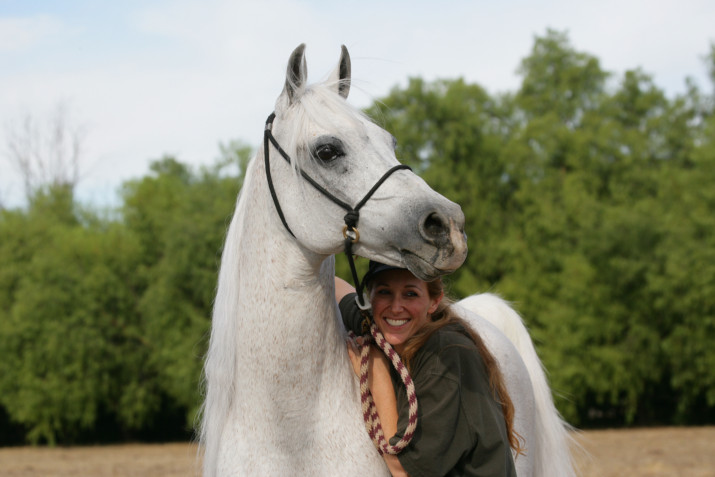
by Shelbrena Payne | Oct 14, 2020 | Feature, General, News
Los Angeles, CA. Saffyre Sanctuary is a horse rescue and rehabilitation program which cares for horses that have been abandoned, abused, or neglected. Today it’s facing challenges on every front. Volunteers and donations have declined, but the cost of operating Saffyre Sanctuary remains the same. It’s one of the many organizations that the COVID-19 pandemic has hit hard. Esta Bernstein Founder and C.E.O of Saffyre Sanctuary, explains, “It has been very challenging. Our donations have decreased by approximately 75% and with the quarantine restrictions set in place we have not been able to bring in volunteers we need.” The sanctuary saw a dramatic decline in weekly volunteers from 12 down to approximately 2-3 volunteers a week.
Esta Bernstein continues to work to keep the doors of the sanctuary open during the global pandemic. Saffyre Sanctuary was recently granted a U.S Small Business Loan, offered to nonprofits for sustainability purposes during the pandemic. The organization’s outdoor facility has provided Saffyre Sanctuary with an opportunity to partner with the City of Los Angeles Departments Rehabilitation Program. “The City of Los Angeles partners with another organization that pays students who recently graduated minimum wage to volunteer at the sanctuary.” This is a great volunteer opportunity for both the recent graduates to gain valuable work experience and the organization to continue operations.
Further positive developments that have emerged during the pandemic include increasing sanctuary locations. Esta Bernstein is in discussions with property owners looking to help the organization expand their mission by providing remote satellite locations for the rescued horses. She is hoping to have negotiations finalized this year. Expansion comes at a cost, the average monthly expense for one horse not excluding veterinary, chiropractic, supplements and dietary feed is $850.00 a month. Saffyre Sanctuary offers a Virtual Forster Care Program that allows individuals to sponsor a horse rescue. “Taking in horses won’t do any good if they don’t have money to feed them. We must develop a new foothold in the community,” said Esta Bernstein.
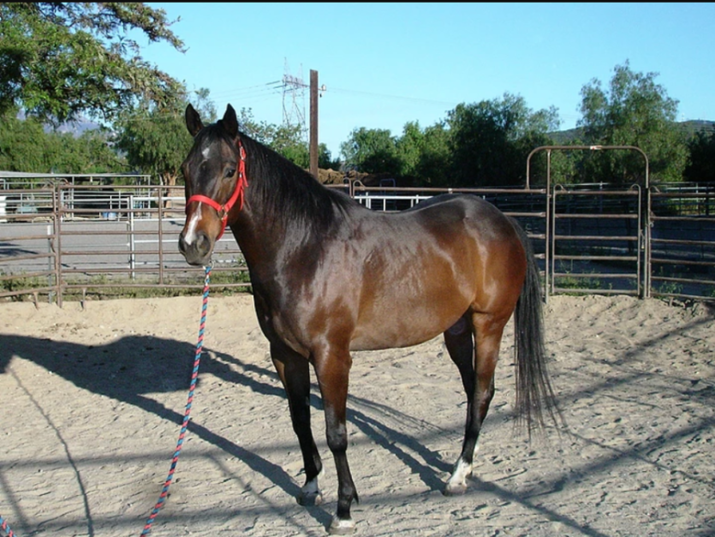
Foster Care Program: Lakota (which means friend) is a 15 year old Thoroughbred Gelding. Blind in one eye, he has been living at Saffyre Sanctuary since July 15th, 2012. Photo by Esta Bernstein.
Horse rehabilitation and healing of the soul is what the founder of Saffyre Sanctuary, Esta Bernstein is all about. One of the programs that Saffye Sanctuary offers is Equalia Actualization program. This program builds the bridge between the people in the community and the rescued horses. This experience allows for people of all ages including the physically impaired, to heal spiritually and emotionally along with the horses who to have experienced trauma.
Saffyre Sanctuary continues to rehabilitate mentally and physically abused horses with the help of committed staff, donors and volunteers during the pandemic. Esta continues to look forward to a brighter future for the health and wellness of the rescued horses and community members. “When you ask for nothing you receive everything, says Esta Bernstein Founder and C.E.O.
From Saffyre Sanctuary:
Saffyre Sanctuary, located in Los Angeles, California, is a horse rescue and rehabilitation program that cares for horses that have been abandoned, abused, or neglected. By allowing them to rediscover their true nature, we provide every opportunity for them to experience the possibility of enjoying a second career, or offer them a well-deserved retirement due to soundness issues, age, or owner hardships. Saffyre Sanctuary Mission: To rescue and rehabilitate horses and heal the world we share!
For more information on the organization please visit:
Saffyre Sanctuary
Saffyre Sanctuary – YouTube Channel
What’s Good!: Saffyre Sanctuary Spectrum News 1
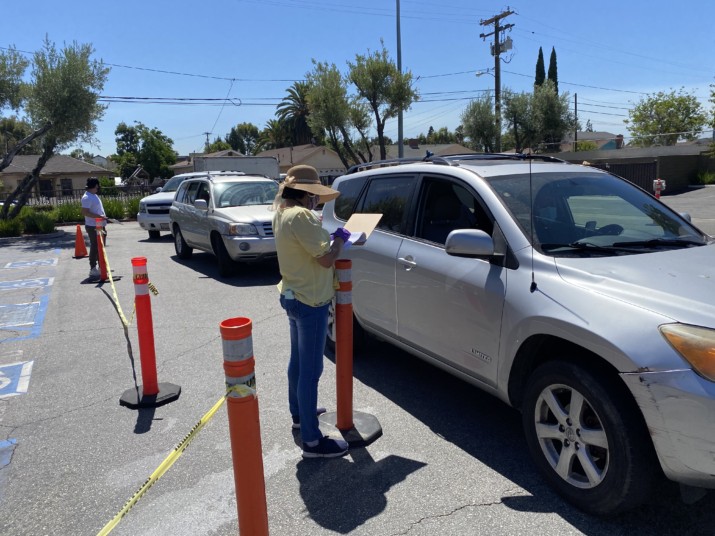
by Sydney Mathews | Oct 3, 2020 | Feature, General, News
Los Angeles, CA. During the beginning months of the pandemic, Inclusive Action for the City has helped to provide immediate cash relief for small businesses and street vendors who were not eligible for government financial support. One hundred and twenty street vendors impacted by COVID-19 received $400 cash cards in early June through the Street Vendor Emergency Fund (see above).
For several decades, tens of thousands of street vendors have served the residents and tourists of Los Angeles despite the fact it was a criminalized practice in the city. It wasn’t until 2008 when they came together to legalize street vending with the help of the organizations that specialized in community development like East LA Community Corporation (ELACC).
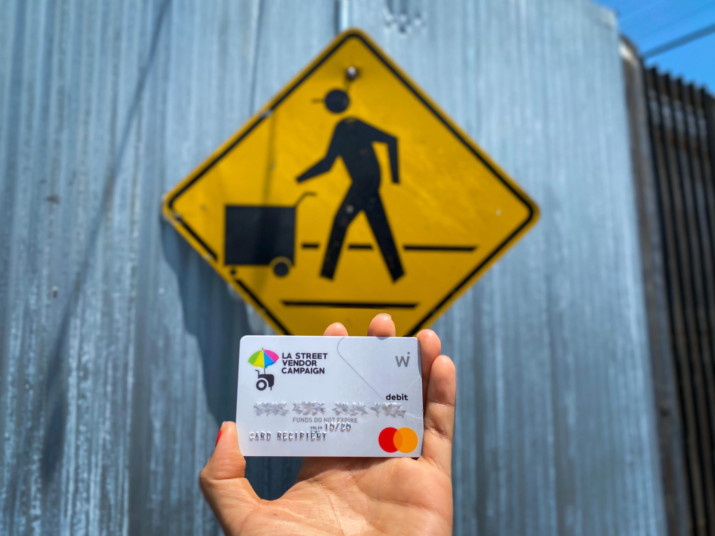
Cash Cards for Street Vendors were much appreciated.
As street vendors started working with nonprofits, the Legalize Street Vending Campaign: Leadership for Urban Renewal Network (LURN) was created and focused on advocating for low-income communities, primarily concentrated with small businesses.
It wasn’t until a decade later that the long-term efforts of LURN and other committed communities paid off. Street vending became legal in November 2018, and low-income entrepreneurs were able to take control of their businesses and take care of their families without risking their livelihood.
LURN would eventually be renamed to Inclusive Action for the City and two years later, as COVID-19 became a predominant concern, there was a need for immediate relief for small, informal businesses.
“Inclusive Action is a lender, we provide small business loans to entrepreneurs,” said Inclusive Action’s executive director Rudy Espinoza, “many of our clients are street vendors, and they were coming in already anticipating that they were not going to be able to make their payments.”
Street vendors are not generally eligible for small business relief funds or other forms of government-sponsored financial support. Espinoza and his team were aware of this and heavily discussed in mid-March whether or not they should provide loans to those who were struggling with the quarantine. However, Inclusive Action decided against this action.
“We should not be doing loans to people right now that are struggling, but we need to get people cash,” Espinoza declared.
It was decided that the best way to help street vendors immediately was to distribute $400 cash cards (seen above) that could be withdrawn and used however the individual chooses. The decision allowed for the creation of the Street Vendor Emergency Fund with the collaboration of ELACC and Public Counsel.
1,032 street vendors were given immediate relief with the fund over the summer but Espinoza believes its “a drop in the bucket” to the much larger systemic issue of street vendors not being eligible for government benefits and having to rely on nonprofit organizations for relief during the pandemic.
“There should be more systems to protect vendors and take care of them during pandemics,” Espinoza said, “and the fact of the matter is that many of them have been struggling for a long time.”
There is hope for vendors to receive more immediate relief and support by the city as the Sidewalk Vending Pilot Program was recently passed by the LA County Board of Supervisors which will invest $1 million in assisting vendors with health-compliant equipment, education outreach, and other needs that will allow street vendors to safely sell in unincorporated areas of Los Angeles.
If you have the means to donate to Inclusive City for the City to continue working to help street vendors, click here.
From Inclusive Action for the City:
Inclusive Action addresses the root causes of poverty by merging good urban policy with sound economic development initiatives that reduce barriers, increase opportunity, strengthen local economies, and empower low-income residents and entrepreneurs across Los Angeles.
Our programs and initiatives seek to uplift those who face the most obstacles to social and economic opportunity. Inclusive Action empowers communities by prototyping innovative, scalable solutions that seek systems change, generating models that can be replicated and applied to all types of urban environments.





















